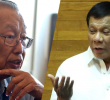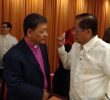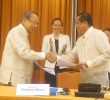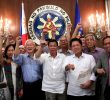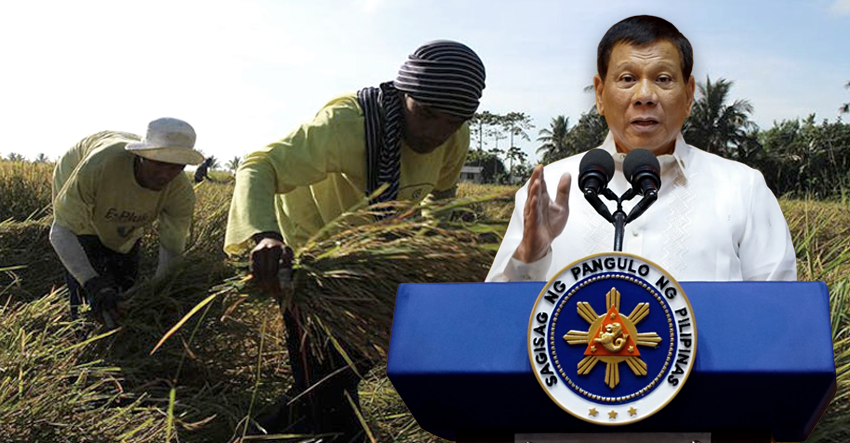
DAVAO CITY, Philippines — A week before President Rodrigo Duterte delivered his second State of the Nation Address, negotiators were engaged on a table battle to discuss reforms which would hopefully end the armed conflict.
Randall Echanis, member of the National Democratic Front Reciprocal Working Committee on Socio-Economic Reforms, told Davao Today in a telephone interview that bilateral teams of the government and the NDFP met last July 15 to 17 and tackled the provision on Agrarian Reform and Rural Development (ARRD).
He said their meeting achieved “positive advances” on the peace negotiations.
The bilateral teams were set up by both Parties during the fourth round of formal talks held in the Netherlands last April 6. The teams which are composed of three members each and supervised by the RWC-SER members aim to accelerate the negotiations on social and economic reforms.
“Positive yung in-advance nung naging pag-uusap (The talks gained positive advance),” Echanis said.
He said the bilateral teams finished tackling “about 60 to 70 percent of the common draft” on the agrarian reform and rural development part of the CASER.
There are still remaining issues which, Echanis said, they hoped to tackle in another bilateral team meeting in August before the fifth round of talks resume to tackle the remaining issues of CASER.
Echanis said the Parties also faced challenges, including the “unpreparedness” of the government on the “promised reformulation” to accelerate the talks of the bilateral team.
“Yung isa pang weakness sa part nila yung kanilang drafting team ay halos hindi familiar sa pinagdaanan na na mga discussion ng RWC (reciprocal working committee) level. Bago yung drafting team nila (Another weakness on their part is that their drafting team is composed of new members and are not familiar with the discussions covered in the RWC level),” he said. Echanis added that before they can proceed, they had to review the processes and the previous agreements.
But those challenges were easily overcome, he said.
The bilateral teams were able to complete the provisions, land distribution, compensation, scope and coverage – these, Echanis said, were “major parts of the provisions on ARRD.”
“We hope we can complete the ARRD provision during our next meeting and begin discussing the provision on national Industrialization and economic development,” he said.
He said it is possible that the Parties can “initial” the ARRD provisions if the fifth round of formal talks will push through next month.
The ARRD provision contains the guiding policy of free land distribution to farmers.
“The farmers will not pay for anything and the arrears or balances on the past agrarian reform law will be written off,” he said.
The ARRD also outlines the support services that should be afforded to farmers. Echanis said free land distribution will not be enough without the support from the government.
“There should be support services so that efficient production is continuous,” he said. Support services will come in the form of credit, irrigation, infrastructure, and crop insurance, among others.
Heart and soul of the talks
Both Parties see the CASER as the “heart and soul” of the peace process, which will put an end to the armed conflict.
Echanis said the problem of landlessness remains a reason why the majority of those who join the NPAs are farmers.
“They are the most exploited sectors of the society and land problem is the reason why there were many peasant uprisings in the Philippines. If this is addressed through reforms, it will be a big help in addressing the problem of the armed conflict,” he said.
Government chief negotiator Silvestre Bello III announced last month that the fifth round of talks will possibly resume in August. But President Duterte, who met on July 18 with the government peace panel gave a directive that there will be no resumption of talks if the NPA will not stop its offensives in Mindanao.
Echanis said another backchannel meeting is scheduled within the week prior to the second SONA of President Duterte to tackle how the fifth round of talks will resume.
However, on the day of Duterte’s second SONA, he lambasted the left for the offensives of the New People’s Army when it encountered with the Presidential Security Group on July 19, in the boundary of Davao City, North Cotabato and Bukidnon province.
Duterte repeatedly said the NPA’s were out to ambush the PSG five days before his SONA. He said he will not talk with the communists anymore.
“Simula ngayon, no more talks. I will prepare government. Lahat ng pera, gagastusin ko muna sa military, wala na muna iyang ano. Sila ang unahin ko (From now on, no more talks. I will prepare government. I will spend the money first for the military, we will set aside the talks, i will prioritize the military),” Duterte said before the families of slain troops in Marawi City on Tuesday, July 25.
Since the encounter in Buda highway last July 19, Duterte has been addressing the communists in various speeches, criticizing them for “demanding a lot” and fighting the government while pushing for talks.
He said if it is war that the communists seek, he will give it to him.
The NDFP said they believe the enabling environment to proceed with the negotiations is the crafting of the CASER, the second substantive agenda of the GRP-NDFP peace talks. The other agenda is political and constitutional reforms and end of hostilities and disposition of forces.
“Ceasefire without substantial reforms will hold no strong basis and will not resolve the armed conflict,” Echanis said. (davaotoday.com)

